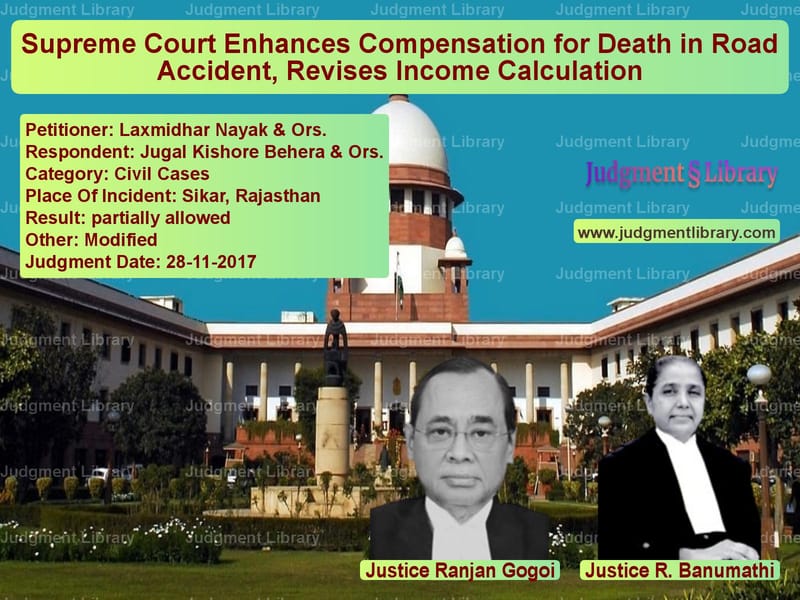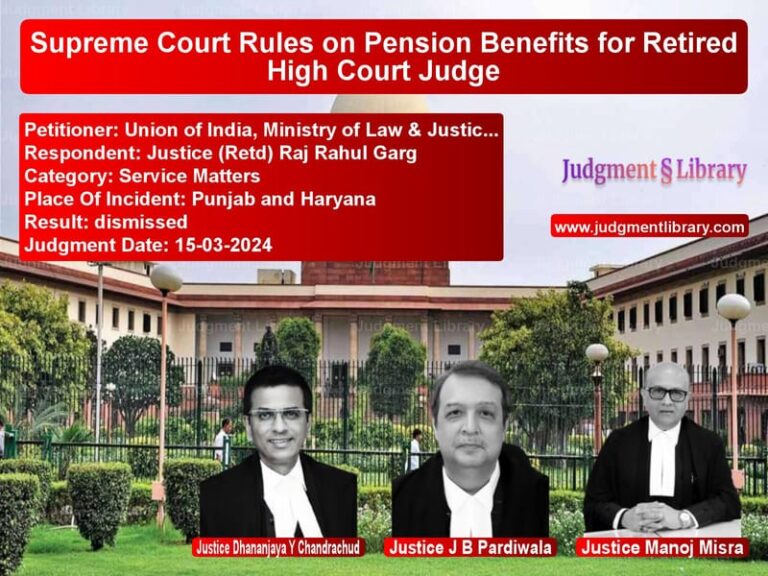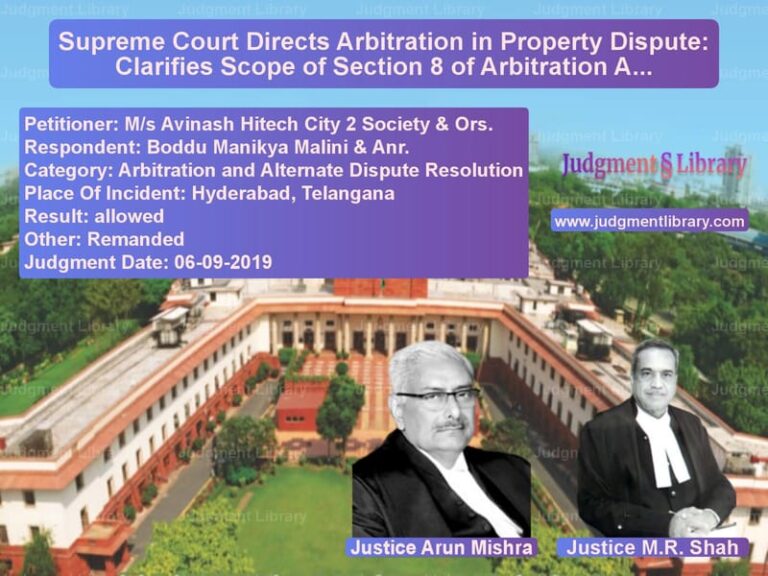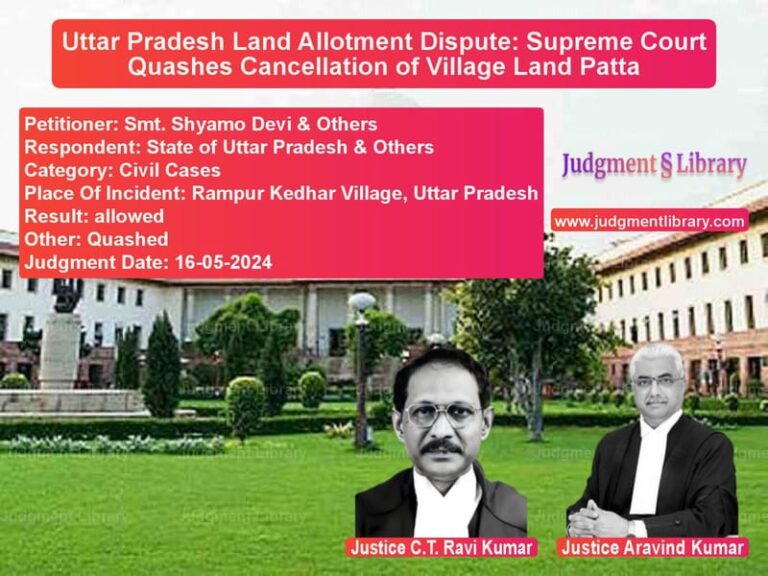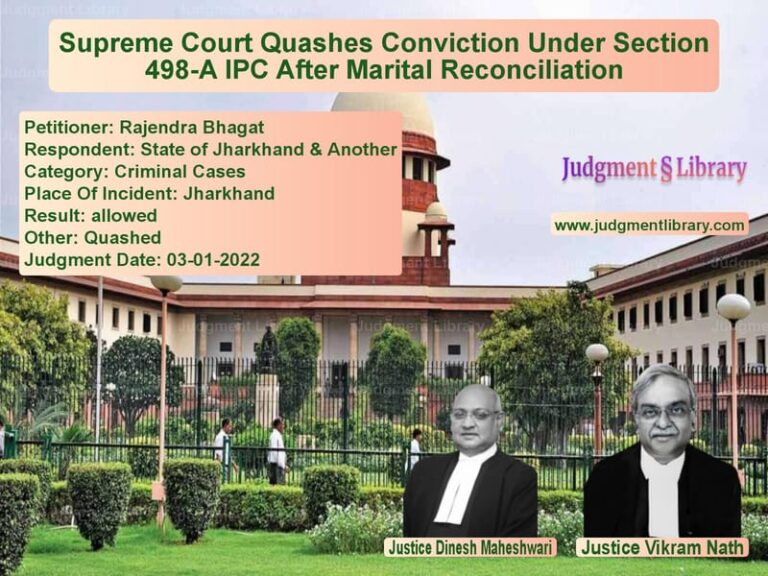Supreme Court Enhances Compensation for Death in Road Accident, Revises Income Calculation
The Supreme Court of India recently delivered a significant ruling in the case of Laxmidhar Nayak & Ors. vs. Jugal Kishore Behera & Ors. concerning the compensation awarded to the family of Chanchali Nayak, who died in a tragic road accident in 1991. The Court’s judgment focused on enhancing the compensation amount and correcting the method of calculating the deceased’s income, which had been undervalued by the lower courts.
Background of the Case
The incident occurred on September 29, 1991, when the deceased, Chanchali Nayak, was walking along with some laborers on the left side of the road in the Sikar district of Rajasthan. A head-on collision occurred between a bus (bearing No. OSF 5157) and a truck (bearing No. OAC 495), causing the bus to swerve to the extreme left side of the road. Unfortunately, the bus ran over Chanchali Nayak, and she succumbed to her injuries.
The family of the deceased filed a claim for compensation under the Motor Vehicles Act. The Motor Accident Claims Tribunal (MACT) initially awarded a total compensation of Rs. 70,600 for the death of Chanchali Nayak. The tribunal determined the monthly income of the deceased to be Rs. 650, a figure that the petitioners believed to be grossly inadequate. The case was then appealed to the High Court of Rajasthan, which reduced the interest rate but upheld the compensation figure. Dissatisfied with the quantum of compensation, the petitioners filed an appeal before the Supreme Court.
Arguments of the Petitioners (Laxmidhar Nayak & Ors.)
- The petitioners argued that the monthly income of the deceased, set at Rs. 650, was too low given that the deceased was an agricultural laborer.
- The petitioners contended that a multiplier of 14 should have been applied instead of the multiplier of 12, and the monthly income should be revised to Rs. 4,500 considering the deceased’s contribution to household work and the family’s maintenance.
- The petitioners also argued that the conventional damages awarded for loss of estate and funeral expenses were insufficient, as they should have been increased to Rs. 15,000 each, as per the recent judgment in the case of National Insurance Company Limited v. Pranay Sethi.
Arguments of the Respondents (Jugal Kishore Behera & Ors.)
- The respondents, representing the vehicle owners and insurance companies, argued that the compensation amount was fair and adequate, considering the deceased’s profession and the circumstances of the accident.
- They pointed out that the compensation had already been calculated using the prescribed multiplier and that the interest rate had been adjusted by the High Court.
- The respondents further emphasized that the insurance company had already paid the compensation, and the additional claim made by the petitioners was excessive.
Supreme Court’s Observations and Judgment
The Supreme Court thoroughly examined the details of the case, including the method used by the lower courts to calculate the income of the deceased. The Court made several key observations before delivering its judgment:
1. Inadequate Monthly Income Assessment
The Court expressed concern over the low income figure of Rs. 650 per month, which was deemed unreasonably low for an agricultural laborer, especially considering the rural setting and the fact that the deceased was also responsible for household work. The Court noted:
“The tribunal’s determination that the deceased’s monthly income was Rs. 650 is far below reasonable expectations. Agricultural laborers in rural areas would have a much higher earning capacity, and this assessment does not reflect the realities of the time.”
2. Revision of Monthly Income
After taking into account the typical wages for agricultural laborers and the household contributions made by the deceased, the Court revised the monthly income to Rs. 4,500, with a contribution of Rs. 3,000 towards the family. The Court observed:
“Considering the income of the deceased from agricultural labor and her role in the household, the correct monthly income is Rs. 4,500, which includes Rs. 3,000 for the family’s maintenance.”
3. Application of Multiplier
The Court found that the multiplier of 12 used by the tribunal and High Court was not appropriate. Referring to the guidelines laid down in the Sarla Verma case, the Court applied a multiplier of 14 for the age group of 41-45 years. It noted:
“For a person aged 42, the appropriate multiplier as per the Sarla Verma case is 14. Therefore, the loss of dependency is calculated at Rs. 5,04,000 (Rs. 3,000 x 12 x 14).”
4. Conventional Damages for Loss of Estate and Funeral Expenses
The Court observed that the conventional damages for loss of estate and funeral expenses, as awarded by the tribunal, were too low. Citing the Pranay Sethi case, the Court increased the amounts to Rs. 15,000 each. The Court ruled:
“In line with the guidelines in the Pranay Sethi case, we award Rs. 15,000 for the loss of estate and Rs. 15,000 for funeral expenses.”
5. Final Compensation and Interest
The Court enhanced the total compensation amount to Rs. 5,34,000, which includes the revised loss of dependency, conventional damages, and interest. The Court ordered:
- Total compensation awarded: Rs. 5,34,000.
- Interest on the total compensation at a rate of 7% per annum from the date of the High Court’s judgment (January 27, 2016).
- Respondents No. 1 to 3 (vehicle owners and insurance company) are jointly and severally liable for payment.
Final Judgment
The Supreme Court ruled in favor of the petitioners, enhancing the total compensation to Rs. 5,34,000, as outlined above. The judgment also addressed the need for fair compensation in road accident cases, particularly for the families of victims who are the sole earners in rural settings. The Court emphasized the importance of proper calculation of income, as well as fair and adequate compensation for loss of dependency and funeral expenses.
Conclusion
This ruling sets an important precedent for the calculation of compensation in road accident cases, particularly in rural areas. The Court has taken into account the real earning capacity of the deceased, the contributions to the family, and the need for fair compensation in such cases. The judgment ensures that the victim’s family receives adequate compensation and that the principle of justice is upheld in road accident cases.
Don’t miss out on the full details! Download the complete judgment in PDF format below and gain valuable insights instantly!
Download Judgment: Laxmidhar Nayak & Or vs Jugal Kishore Behera Supreme Court of India Judgment Dated 28-11-2017.pdf
Direct Downlaod Judgment: Direct downlaod this Judgment
See all petitions in Damages and Compensation
See all petitions in Property Disputes
See all petitions in Landlord-Tenant Disputes
See all petitions in Judgment by Ranjan Gogoi
See all petitions in Judgment by R. Banumathi
See all petitions in partially allowed
See all petitions in Modified
See all petitions in supreme court of India judgments November 2017
See all petitions in 2017 judgments
See all posts in Civil Cases Category
See all allowed petitions in Civil Cases Category
See all Dismissed petitions in Civil Cases Category
See all partially allowed petitions in Civil Cases Category

